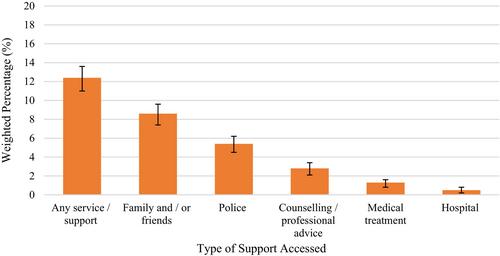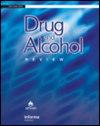Accessing supports due to others' harmful drinking
Abstract
Introduction
Alcohol's harm to others (AHTO) refers to harms caused to those other than the drinker. The current paper estimates the prevalence of formal and informal supports sought due to AHTO and examines whether the type of support accessed varies by sociodemographic, economic and harm-related characteristics.
Methods
An Australian sample of 2574 people completed the 2021 AHTO survey, out of which 888 perceived they experienced harm from another's drinking. Prevalence of accessing services and supports was measured. Additionally, several sociodemographic factors, economic factors and harm-related factors were included in multivariable logistic regression models predicting service/support use. Specifically, four models were constructed probing use of any service/support, use of police, use of counselling services and use of family/friend support.
Results
Of the survey sample, 12.4% accessed any support/service. Seeking support from family and/or friends was most common, followed by police, counselling, healthcare services and being admitted to hospital. Women had higher odds of accessing counselling and family/friend support. Respondents with a higher education level and two or more financial stressors had higher odds of accessing police and counselling. Respondents harmed by a stranger had higher odds of accessing police, whereas respondents harmed by someone they know had higher odds of seeking support from family/friends. Experiencing more severe harm was associated with greater odds of accessing any support.
Discussion and Conclusions
Several sociodemographic and economic factors were associated with accessing different supports. These findings may inform service development, interventions and policy changes for people affected by others' drinking.


 求助内容:
求助内容: 应助结果提醒方式:
应助结果提醒方式:


